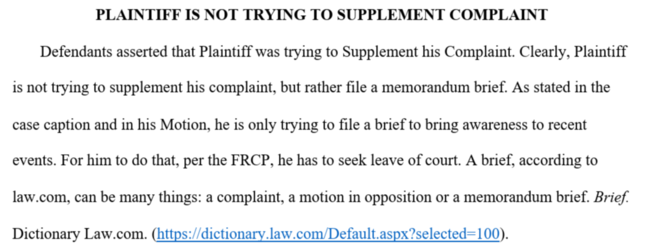

Subjectively believing your action to be filed in Good Faith, does not necessarily mean it was filled in Good Faith, and filing motions that contain irrelevant arguments (such as whining about Kiwi Farms' actions towards non-parties who are not relevant to the case) can be found to have been made in bad faith, and sanctioned (Jack A. Braley, D.O. v. Garland CAMPBELL, M.D., 832 F.2d 1504 (10th Cir. 1987), Robert H. Ketchum v. Salvador Cruz, M.D., Spanish Peaks Mental Health Center, 961 F.2d 916 (10th Cir. 1992), Jane Niehaus and Joyce Neumann v. Kansas Bar Association, John Gardner, and Marcia Poell, 793 F.2d 1159 (10th Cir. 1986), etc.)


I think Russ did an excellent job defeating his own argument. Reminder, this contradiction is only a paragraph apart.
To the extent that he alleges he was harmed by "Kiwi Farms" "st[ealing his intellectual property", one might find it interesting that he never sued Kiwi Farms for stealing his copyright, merely for alleged contribution of such stealing. This contradiction would constitute bad faith as per Graff v. Aberdeen Enterprizes II, Inc., 4:17-CV-606-CVE-JFJ (N.D. Okla. Sep. 20, 2018 ). His "defamed" comment suffers the same fault, given he has acknowledged he has no cause to sue neither Null, nor Kiwi Farms itself


There are better citations then "law.com" such as mayhaps Rule 7, 8, 10 of FRCP. That being said, a brief being filed that serves no other purpose than to supplement a complaint, is by necessity, supplementing a complaint. Anyhow, you filed that "memorandum brief" via rule 15, rule all about supplemental pleadings, of which complaints are a part (rule 7). Given the above mentioned information, one could easily see how Skordas saw this as nothing more than an attempt to supplement your complaint. Any how, whatever this would be, it is still futile and should be dismissed (Earles v. Cleveland, 825 Fed.Appx. 544, 552 (10th Cir. 2020))

Plaintiff has withdrawn any Harassment elements


Skordas is not suing you. You are suing his client

Note the should and can. Either way, ABA is not binding law, merely a guideline.

The law is not concerned about whatever or not you believe you can win, only that there is a "substantial likelihood" that you will win. See, for example, Equitable Nat'l Life Ins. Co. v. AXA Equitable Life Ins. Co., 434 F. Supp. 3d 1227 (D. Utah 2020)

You did not show that. You at best alleged it, without being able to provide anything substantial to back it up.

After looking over the docket I can only assume he means docket number 14 (the only one (by a judge) in January), which notably did not say anything even close to that. See for
yourself.

He very neatly puts it here that this motion was indeed filed in bad faith/frivolously.























